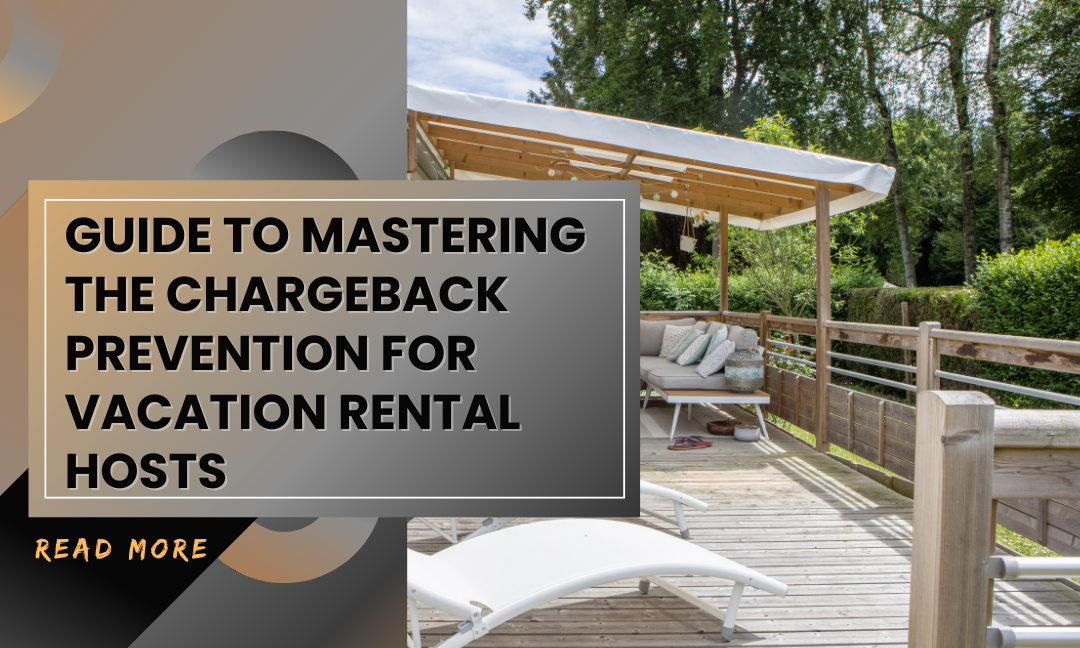Chargebacks are an unwelcome and frustrating reality for vacation rental hosts. These financial disputes occur when a guest disputes a charge on their credit card statement, and the funds are withdrawn from the host’s account. Chargebacks can result from various reasons, including unauthorized transactions, service disputes, and fraudulent activities. Chargeback prevention for vacation rental hosts can be time-consuming, costly, and damaging to your reputation. However, with the right strategies and precautions, you can significantly reduce the risk of chargebacks and ensure a more secure and profitable hosting experience.
Understanding Chargebacks
Before delving into strategies for chargeback prevention for vacation rental hosts, it’s essential to grasp the root causes and how they affect vacation rental hosts:
Unauthorized Transactions: This occurs when a guest claims that they did not authorize or recognize a charge on their credit card statement. It might be a legitimate oversight, or it could be an attempt to get a refund dishonestly.
Service Disputes: These chargebacks arise when guests disagree with the service quality during their stay. Common examples include misrepresentation of property conditions or unmet amenities.
Fraudulent Activity: In cases of credit card fraud, a guest’s payment information may have been compromised or stolen and used for booking a vacation rental.
Proactive Chargeback Prevention for Vacation Rental Hosts
Now, let’s explore practical strategies that can help you proactively prevent chargebacks and minimize their impact on your vacation rental business:
Clear and Accurate Listings: One of the most common sources of chargebacks is misleading property descriptions. To avoid this, ensure your listings are detailed, truthful, and up-to-date. Use high-quality photos and provide an exhaustive list of amenities.
Effective Communication: Maintain open, prompt, and courteous communication with your guests throughout their booking journey and stay. Address their inquiries, requests, and concerns promptly, creating a positive and trustworthy guest experience.
Written Policies and Agreements: In writing, outline your house rules, cancellation policies, and refund policies. Ensure guests read, acknowledge, and agree to these terms during the booking process. Having written agreements can significantly reduce misunderstandings.
Security Deposits: Consider collecting a security deposit from your guests. This can discourage frivolous chargeback claims, as guests understand that their deposit is at risk for damages or violations of your policies.
Professional Property Management: If you find managing guest interactions and resolving issues challenging, consider hiring a professional property management company. These experts can handle guest communication and address concerns efficiently.
Use a Trusted Payment Processor: Employ a reputable payment processor to handle your transactions. Many of these processors have built-in chargeback prevention tools and fraud detection mechanisms to help safeguard your revenue.
Dealing with Chargebacks
Despite your best efforts, chargebacks may still occur. In such cases, it’s essential to know how to handle them effectively:
Gather Evidence: When notified of a chargeback, start collecting all relevant documentation immediately. This should include the rental agreement, communication history with the guest, and any evidence related to the property’s condition.
Contact the Guest: Reach out to the guest once you’re informed of the chargeback. Attempt to resolve the issue amicably through direct communication. Often, chargebacks arise from misunderstandings that can be clarified through dialogue.
Dispute the Chargeback: If you believe it is unjustified, work closely with your payment processor to dispute it. Provide all the evidence you’ve gathered to support your case. Be thorough and persistent during this process.
Learn and Improve: View chargebacks as learning opportunities to enhance your hosting practices. Identify areas where you can improve guest satisfaction and prevent future disputes. Continuous improvement can reduce the likelihood of chargebacks in the long run.
Chargeback prevention for vacation rental hosts is crucial to maintaining a successful business. You can significantly reduce the risk of chargebacks by implementing clear communication, well-defined policies, and a commitment to excellent service. However, it’s equally important to know how to handle them effectively if they do occur. Remember, a well-managed vacation rental business is built on trust, transparency, and a dedication to providing guests with exceptional experiences.
Struggling with chargebacks or seeking expert advice on optimizing your vacation rental business? Contact us today for professional vacation rental consulting services. We’re here to help you protect your revenue and enhance your hosting experience.

